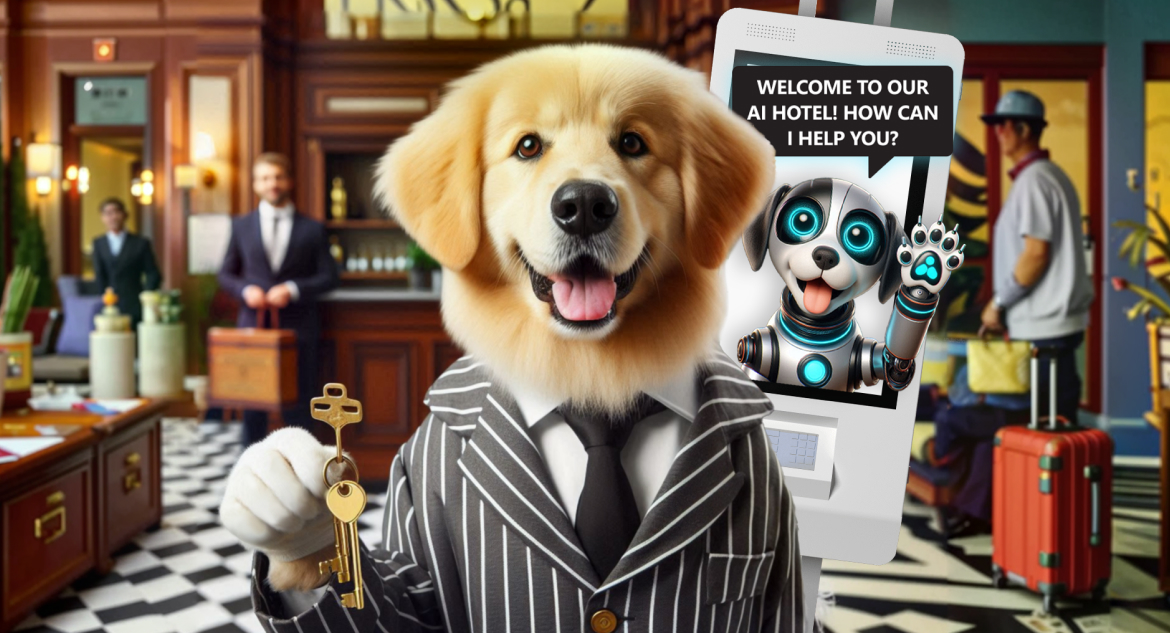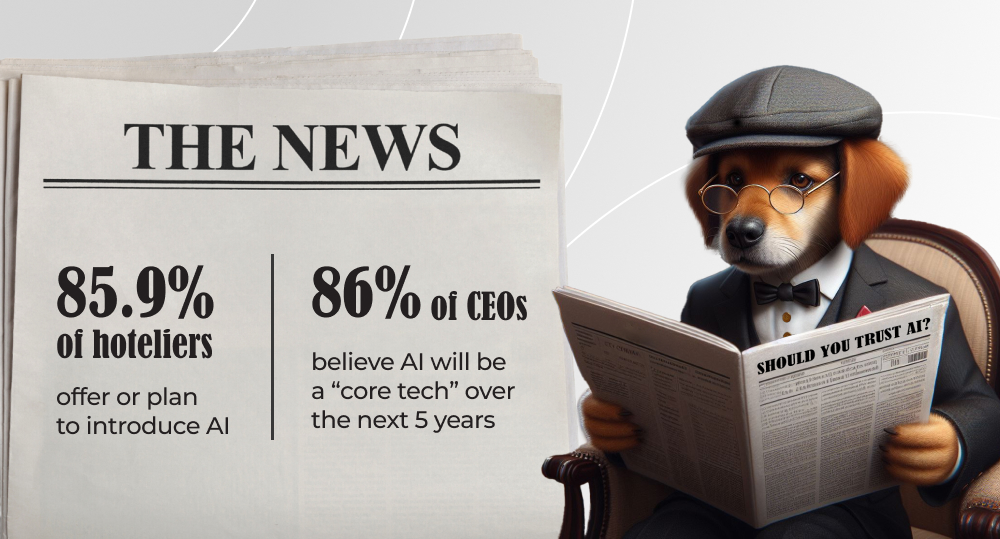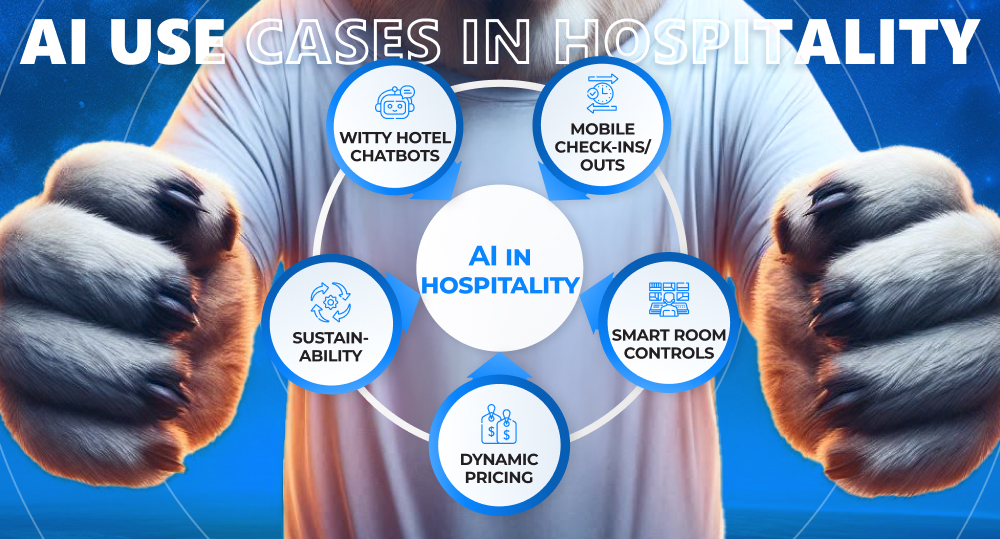Will AI in the hospitality industry leave hoteliers behind? Recent stats reveal intriguing trends: hotels that embrace AI to tailor guest services enjoy 2–4 times higher revenue, efficiency, and guest satisfaction compared to their non-adopting peers. The question is no longer whether to embrace AI. It's about making it your ally — the one that won't leave you behind.
But how on earth should you adopt AI in your hospitality business? Or is there something that should stop you? Read on and find your reason to go along.
written by:
Anton Rykov
Product Manager
Will AI in the hospitality industry leave hoteliers behind? Recent stats reveal intriguing trends: hotels that embrace AI to tailor guest services enjoy 2–4 times higher revenue, efficiency, and guest satisfaction compared to their non-adopting peers. The question is no longer whether to embrace AI. It's about making it your ally — the one that won't leave you behind.
But how on earth should you adopt AI in your hospitality business? Or is there something that should stop you? Read on and find your reason to go along.
Contents
Welcome to the Intersection of AI and Hospitality
Siri, what's the weather outside this morning? Open the curtains, turn on yesterday's song on Spotify, set the temperature to 68 degrees, and call room service. Oh yeah, and order breakfast delivery, please. Remember, coffee, no sugar!
A few years ago, uttering these commands would have raised eyebrows. Until the day when Siri happened and became an impeccably trained concierge catering to your every whim.
Fast-forward to today, and AI has transformed into a good ol' friend for travelers ready for any adventure. It greets you at every turn, from the website where you book airline tickets to the hotel feedback form you fill out after checking out of your room.
What to say when you have tools like Vacay Chatbot, which can plan an unforgettable trip to any country with a couple of clicks. It guides tourists from hotels to hidden city gems, sharing photos and expert advice on the best routes, transportation options, and charming B&Bs — all within your budget. A prompt from a user is all it takes to walk unfamiliar streets like a local.
What Is AI for Hotels: a Regular or a Passer-By?
Imagine: you enter a sleek hotel lobby, eyes scanning for a friendly face behind the reception desk. But instead, there's a futuristic kiosk. Suddenly, a melodic voice chimes in, “Welcome to our hotel! How can I help you today? Do you have a reservation, or shall I find the perfect room for your stay?”
Indeed, hotel chatbots, mobile concierges, and even robotic bellhops have gone beyond sci-fi dreams. They now greet weary travelers all over the globe. And the stats speak volumes:
- 85.9% of hoteliers are either offering or planning to introduce AI in hotels through in-room technology. (Stayntouch)
- 86% of CEOs believe AI will soon be a “core tech” in their companies over the next five years. (pwc)
AI hotel software and travel optimization tools is an inspiring source for growth and innovation. With this wealth of opportunity comes what you’re in the business for — a vast audience and profits. Let's take a look at the specific areas ripe for development.
Use Cases of AI in Travel and Hospitality: Room Service 2.0
At first, we all used Airbnb, Booking, Hotels.com, and a host of other traditional apps for travelers. But then artificial intelligence came along, and the public favorites had to adapt. Some quickly incorporated AI algorithms into their architecture, while others retreated into the shadows, making room for savvy newcomers like iPlan.ai.
What path will you tread? Down the familiar road of mainstream hotel operations, or the thrilling journey of hospitality innovation fueled by IoT and generative AI? Let’s figure out together what’s there in hospitality for AI.
Witty Hotel Chatbots
Retail chatbots help you decide between two table lamps on Amazon, while their banking counterparts assure you can afford both (plus one more for the kitchen). But what are the hotel chatbot's superpowers?
- Swift responses: they handle simple guest queries, like how to turn on the air conditioning, locate parking, or connect to free Wi-Fi;
- Tourist assistance: available 24/7, they guide tourists through reservations, suggest optimal stay dates, and recommend where to admire an Instagrammable city view;
- Targeted marketing and service enhancements: they're active listeners, gathering insights about tourists' preferences.
Mobile Check-Ins and Check-Outs
What could be more exhausting than standing in line at the front desk, waiting to check in? And the paperwork… By the time you're done, you could have taken a refreshing shower, grabbed a quick bite, and napped after that long flight.
Good news: hotel artificial intelligence is here to rescue your physical drive and mental sanity. Say hello to remote check-ins and outs, where minimal contact with hotel staff is the name of the game. All you need is a mobile app, and suddenly endless queues at hotels will become a distant memory.
Mobile Check-In
Mobile Check-Out
- Seamless registration upon arrival;
- Room allocation according to guest preferences;
- In-app digital key.
- Hassle-free leave and bill payment in the comfort of the room;
- Personalized recommendations for extra services and amenities based on guest history.
Smart Room Controls
Ever heard the term “Internet of Things” (IoT)? Acting as a matchmaker for devices, it connects everything from usual thermostats to door locks within a building. IoT is a popular technology for outfitting smart hotel rooms. What are they?
These are extra-convenient rooms with a dash of luxury, equipped with smart sensors and voice assistants. What you can find inside:
- Personalized lighting and temperature;
- Automated service requests;
- Keyless entry (e.g., via a personal account in a hotel app);
- Smart energy control;
- In-room entertainment systems and amenities.
Note the hidden gem: IoT lets hotels gather data on guest preferences, enabling targeted marketing. Imagine getting a discount on your favorite spa treatment — all because this new tech in the room knows you love a good massage.
Dynamic Pricing
Hospitality artificial intelligence allows businesses to adjust pricing in real-time by analyzing a wealth of data, including the following essential metrics:
- Competitor pricing;
- Customer behavior;
- Market conditions.
Based on this information, AI recommends optimal pricing strategies. No more fixed rates; hotels can set price tags dynamically. The result satisfies both parties: customers get attractive prices, the hotel — a steady guest flow.
Sustainability and Energy Efficiency
What should be your focus if you want to earn the proud title of “Super Clean Hotel”? In modern realities, you should adhere to sustainability principles, allowing guests to be more eco-friendly during their stay. How can AI in the hospitality industry intensify care for the well-being of our planet?
- Adjust heating and cooling systems based on occupancy patterns;
- Control on-site lighting and electronics, slashing unnecessary power consumption;
- Analyze data on travel patterns, emissions, and infrastructure to recommend sustainable transportation modes;
- Plan green events and suggest local experiences.
Overcoming the Disadvantages of AI in the Hospitality Industry
Challenge
Description
Solution
Tourist data safety
As more hotels, resorts, and tour operators adopt hotel software with AI, the risk of data breaches and privacy violations also grows.
AI relies on data. Hence, you must prioritize robust data protection measures and encryption techniques, adhering to strict regulations such as GDPR and PCI DSS.
Large investment
Hotel owners often assume that AI technology in the hospitality industry demands hefty investments to yield results. While AI robots — or self-driving cars — do come with a substantial price tag, they're just a fraction of the AI tools available to the hospitality sector.
Looking for a wallet-friendly way to use AI in the hotel industry? Start with intelligent chatbots and voice assistants. Bots can cut customer service costs by up to 30% (Chatbots Magazine). Off-the-shelf voice apps, like Siri or Alexa, don't require long and expensive development cycles.
Ethical dilemma
There are two major concerns about AI ethics:
- Bias and discrimination. AI systems inherit biases from the data they are trained on. If that data is skewed or discriminatory, AI can perpetuate those biases.
- Job loss. As artificial intelligence in hotels advances, human workers may be replaced by machines.
Prioritize ethical considerations when implementing AI technologies:
- Monitor and audit your system to ensure fairness and inclusivity;
- Invest in training for employees affected by automation;
System integration
Integrating AI into existing infrastructure is time-consuming. From compatibility checks to staff training, it requires meticulous planning and expert execution. After all, poor integration can result in inefficiencies and data silos. And let’s not forget the human factor — some employees may resist change due to job displacement fears.
Balancing tech adoption with staff comfort is an ideal way out. Invest in robust system integration strategies, customized by working closely with AI developers and IT professionals. Worried about team protests? Thorough testing and training ensure staff readiness.
Human touch vs. automation
The hospitality sector thrives on personalized service and human interaction. Yet, AI adoption poses a challenge: the risk of losing that personal touch guests expect. Particularly for older generations like baby boomers, AI lacks the empathy and emotional intelligence that human employees possess.
The future lies with new generations. It's worth targeting Millennials and Gen Z, who are more optimistic than baby boomers about artificial intelligence. These tech-savvy guests favor self-service and value its perks: true personalization and round-the-clock availability.
Success Stories: How Hospitality AI Nails It
Recogizer: Green Revolution with Artificial Intelligence for Hotels
The Recogizer System is climate-conscious AI that helps hotels shrink their carbon footprint and energy consumption. It's a self-learning tool: after analyzing data on guest behavior, room size, occupancy, and external factors like weather conditions (yes, rain affects energy needs too), Recogizer moves on to predictive management. Every 15 minutes, it optimizes HVAC power usage.
Why hotels love it:
- Eco-friendly vibes: up to 28% less energy waste (as claimed on the website) means a smaller carbon footprint. Mother Earth approves.
- Happy clients: when the indoor climate is just right — not too hot, not too cold — guests smile wider. Happy guests = stellar reviews.
- Reduced energy bills: hotels that chose Recogizer saw their investment pay off within the first year of app operation.
Airbnb's Smart Pricing: Competitive Rates with AI in the Travel Industry
One of the prime AI in the hospitality industry examples is Airbnb's Smart Pricing tool. Here's the scoop: it can automatically adjust nightly property rates based on the following factors:
- Listing details: accommodation type, location, amenities, and guest reviews;
- Seasonality: peak summer or quiet off-season?
- Local context: nearby events, festivals, and even weather conditions play a role;
- Similar offers: AI keeps an eye on comparable properties and their rates.
The best thing about Smart Pricing: it doesn’t rest. It constantly recalculates rates in real-time. Concert in town? Holiday weekend demand spike? It adapts. What does the owner get? Competitive pricing without lifting a finger.
Chipotle: High-End Dining with AI in the Restaurant Industry
Chipotle, a notable example of a tech trailblazer, seems to sense the AI trend much harder than others. The company has even established its own venture capital fund for investing in the latest technologies. What is among its endeavors?
- Inventory intelligence: Chipotle is testing a smart system that monitors inventory levels and predicts restocking needs. It can analyze traffic patterns, weather, and local events to forecast demand.
- Chippy the Robot: the company is also experimenting with an AI-powered robot to cook their famous tortilla chips.
- Pepper the Chatbot: it handles customer inquiries and complaints on the website.
Will You Build a New AI Hotel?
One of the most mind-blowing examples of artificial intelligence in the hospitality industry — fully AI-infused hotels — is a tangible reality today. All you have to do is visit Booking.com to rent a room. But what’s holding you back from building your own smart haven or upgrading your existing hotel with AI?
Perhaps you fear team resistance, worried it'll snatch their jobs away. Or maybe you’re concerned that guests will miss the warmth of human interaction. After all, traveling is about connecting with people and diverse cultures.
But consider this: every line of code, algorithm, and AI decision was crafted by human hands. We, as humanity, are the architects of this technological evolution. Not soulless robots, but we ourselves are defining this future.
So, what’s the verdict? Are you ready to leave your AI footprint? If you’re still pondering the best path forward, reach out to us to explore this budding frontier.
FAQ
Artificial intelligence in the travel and hospitality industry refers to the strategic implementation of AI technologies within travel, accommodation, and related services. Its major goals are:
- Enhancing guest experience;
- Streamlining human operations;
- Service personalization;
- Cost optimization.
While AI is still in its infancy, it can't fully replicate the human touch: our empathy, emotional intelligence, and creative thinking. Every word AI writes or speaks reflects the data it was trained on. It lacks the ability to create truly novel ideas.
But the future remains uncertain. McKinsey's research suggests that by 2040, certain AI capabilities may surpass the top 25% of human performance. In the long term, this could lead to the replacement of some human staff in the hospitality industry.
Mara's comprehensive study, conducted from a management perspective, sheds light on the key obstacles:
- 30% of managers mention the expense of artificial intelligence in the hotel industry as a significant hurdle, particularly for smaller establishments;
- 27% indicate a lack of perceived need;
- 20% worry about the intricacies of AI technology.
When it comes to implementation barriers, hoteliers most often cite:
- 59% — technical expertise gap;
- 30% — staff resistance;
- 7% — high cost.
As WeMarketResearch states in its report, in 2022, AI in the hospitality market was valued at $90M. What about the future? It's expected to soar to an impressive $8B by 2033.
Artificial intelligence has a job to do in any industry. In hospitality its most popular applications are as follows:
- A friendly ally for guests: “Need extra beds? Here you go!”;
- Mr. Know-It-All, suggesting ideal options for everything from local attractions to the nearest Michelin restaurant (even in the middle of the night!);
- Big Brother, watching you and analyzing guest feedback, staff performance, and resource allocation;
- A flawless customer support specialist, instantly answering online chat questions;
- A risk management expert, identifying any weaknesses in the hotel's security system.
Certainly! And industry insiders confirm this, emphasizing the transformative power of artificial intelligence for hospitality:
- 55% of hoteliers believe smart innovations will reshape the hospitality sector for the better.
- A spacious bathroom with eco-friendly fixtures (low-flow toilets, water-saving shower heads), contributing to water conservation.
- A kitchenette or fridge in the rooms, allowing guests to store and prepare meals, reducing food waste.
- Encouraging guests to reuse towels and linens for environmental sustainability.

Contacts
Feel free to get in touch with us! Use this contact form for an ASAP response.
Call us at +44 151 528 8015
E-mail us at request@qulix.com










